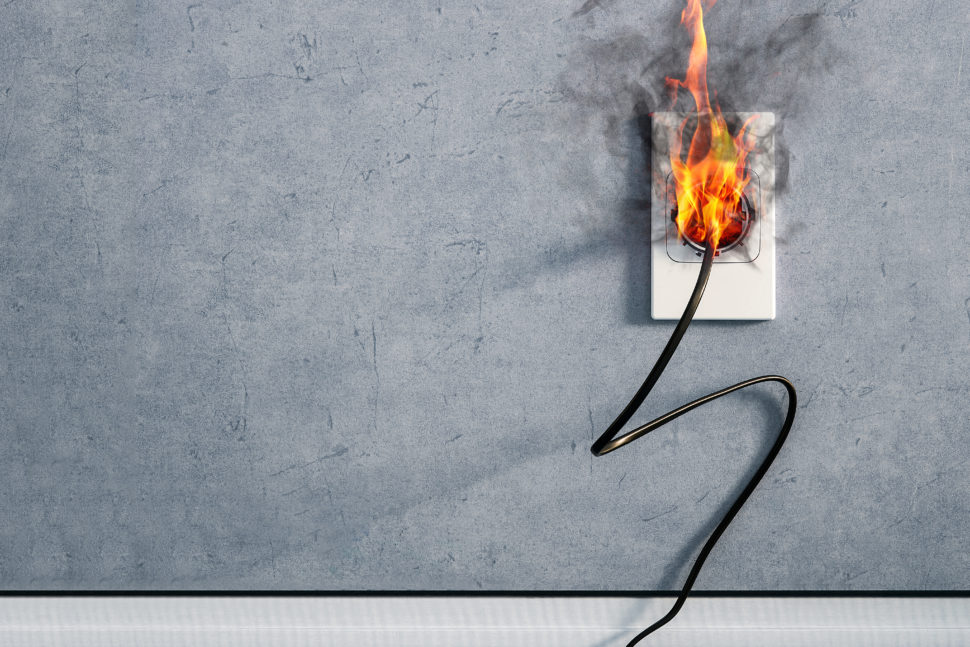Electric Fires: Causes and How to Prevent One
Filed under: Uncategorized
Comments: None

Electrical fires are common in both residential and commercial settings and can do some serious damage to your property and put everyone’s safety at risk. Annually, U.S. fire departments respond to over 50,000 electricity-caused residential structure fires a year, resulting in over 500 deaths, more than 1,000 injuries, and over $1 billion in property damages. On the commercial side, according to the U.S. Fire Administration (USFA), over 8,000 fires occur from electrical malfunctions, totaling more than $400 million in damages.
The good news is that electrical fires in your home or facility are often preventable if you take certain precautions. It’s important to be aware of what causes a fire so you can actively work to avoid it. Today, we’re sharing the most common causes of an electrical fire and how to prevent them.
What Is an Electrical Fire?
The first step in learning how to prevent an electrical fire is understanding what one is. An electrical fire occurs when an electrical component of an appliance, equipment, or machinery malfunctions. The fire typically originates in electrical wires, cables, cords, electrical panels, or circuit breakers once the part becomes overloaded with an inadequate distribution of electricity. Occasionally, an electrical fire can start from a light source when it is too close to something that is easily ignitable. Common causes of electrical fires are outlined below.
Lack of Maintenance
The number one cause of electrical fires is a lack of maintenance. At least once a year, regular maintenance should be performed on your electrical panels and equipment to reduce the risk of a fire. A preventive maintenance plan should include cleaning the equipment and removing any dirt or debris, inspecting and replacing frayed, damaged, or faulty wires and cords, and examining and testing the power system. It’s important to always hire a commercial electric engineering contractor to work on your electrical equipment and wiring as they are bonded and insured and know the proper electrical, building, and fire codes that need to be followed.
Outdated or Worn-out Wiring
Homes and commercial buildings that are over 20 years old may have outdated electrical wiring that can cause a fire. Knob-and-tube wiring, aluminum wiring, and 60-amp electrical systems are all found in older buildings and tend to come with a greater risk of overheating because they cannot handle the increased power load. While electrical work is often hidden behind walls, it’s important to know the signs:
- Frequently overloaded circuit breaker
- Unexplained power outages
- Flickering lights
- Equipment that feels excessively hot
- Shocks or sparks from outlets
- Burning smells
If you notice any of these warning signs, consider upgrading your electrical system with modern wiring.
Old Equipment or Appliances
According to USFA, 19% of commercial building fires are caused by equipment, appliances, or electrical malfunctions. Oftentimes, older appliances and equipment are not up to standard when it comes to fire and electrical codes and safety regulations. If feasible, update old and faulty machinery with modern equipment. If that’s impractical for your facility, try replacing outdated circuits within electrical panels to reduce the risk of a fire.
Electrical Overloads
Extension cords are only meant to be used temporarily. Unrestricted use is a major fire hazard. A single socket isn’t meant to handle that much electricity and when you overload a single extension cord, it creates an excessive power load. If you need additional, permanent power sources, consider hiring an electrician to install more outlets.
Light Fixtures and Portable Heaters
Lamps, lightbulbs, and portable heaters are all common causes of electrical fires. Light bulbs aren’t one-size-fits-all so be sure to check recommended bulb wattage on light fixtures and lamps before using. Another thing to watch out for is placing flammable materials near or on top of light sources. Once heated, the material can ignite. Portable heaters are another cause for concern. Never place a portable heater near your curtains, rugs, bed, blankets, couches, and other flammable items. Avoid leaving it on for an extended period, especially when sleeping or leaving your house.
If you’re wondering how to prevent an electrical fire, these are just some of the preventative steps you can take. Electrical fires pose a significant threat to your residential or commercial property. If you notice one or more of these signs, stop using the equipment, electrical outlet, or device and contact a commercial electric engineering contractor right away.
